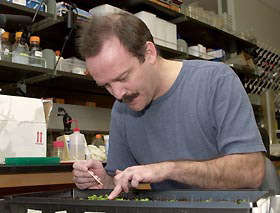|
This is an archived article.
For the latest news, go to the Advance
Homepage
For more archives, go to the Advance Archive/Search Page. | ||
|
Genetically Engineered Plant Could
Help Third World Farmers
The researchers used a gene responsible for the development of a pump that works inside plant cells to trigger the sequestering of ions - including sodium (salt) ions - into vacuoles. Vacuoles are large storage spaces within the plant's cells. Taking toxic ions, such as sodium, out of circulation allows normal plant metabolism to proceed.
This enhanced uptake of ions into their vacuoles in turn improves water retention in the transgenic plants and their resistance to drought. A description of the team's findings appeared in the September 25 issue of the Proceedings for the National Academy of Sciences. The team's discovery has commercial as well as scientific implications. According to the World Bank, continued growth in world population over the next 30 years is expected to require an increase in food production of 60 percent in developing countries. These countries are the most affected by drought and salinity. "The prospect of feeding humanity as we enter the new millennium is formidable," says Gaxiola, an assistant professor-in-residence of plant science who conducted the study with scientists at Harvard Medical School, the Massachusetts Institute of Technology, and the University of California at San Diego. "Our results suggest that the genetic manipulation of vacuolar proton-pumping pyrophosphatases in economically important crops could provide an important avenue for crop improvement." Charles Goodwin, director of technology licensing for UConn's Center for Science and Technology Commercialization, says the Center has applied - together with MIT - for patents resulting from the team's findings. Gaxiola worked at MIT before coming to UConn in January 2000. "We expect this technique can be applied to many crop plants," Goodwin says. "We're looking for companies interested in commercializin g this approach." Depending on the crop, Gaxiola says it would take between two and four years to engineer viable transgenic commercial crops. Scientists have been trying to develop drought-tolerant and salt-tolerant crop varieties for decades to help farmers in arid regions around the globe. In Gaxiola's native Mexico, for example, some farmers depend on rainfall to water their crops. Under these conditions, a week without rain often makes the difference between success and failure. Other farmers use irrigation water to grow crops. Yet as the water flows from its source in rivers and streams, soluble minerals such as sodium are picked up and deposited in farmers' fields. The gradual accumulation of salt in the topsoil transforms very productive areas into wastelands. Plant cells are like balloons full of water under pressure. Storage cavities inside plant cells, or vacuoles, make up about 90 percent of a cell's volume and are responsible for growth and plant rigidity. Water molecules easily pass in and out of plant cells, yet the cells cannot control this movement. Instead, it is the concentration of solutes (dissolved substances, such as sodium ions) in and outside plant cells that affects water movement. As plants seek to equalize the concentrations of solutes inside and outside their cells, water follows, through the process known as osmosis. Gaxiola and his team worked on the hypothesis that increasing a plant's storage capacity to accumulate solute concentrations would enhance the plant's tolerance of salt and drought. In the process of sequestering salt into vacuoles, plant cells depend on electrochemical energy generated by two vacuolar pumps, says Gaxiola. The researchers expected that genetically modifying the plant to increase the dosage of either of these pumps would increase the vacuole's storage capacity. Arabidopsis thaliana has become an especially useful tool for plant researchers, as it is one of the few laboratory plants that has its entire genome sequenced. Gaxiola and his team took advantage of the fact that one of the plant's vacuolar pumps is encoded by a single gene - a vacuolar proton-pumping-pyrophosphatase (AVP1). Using bio-engineering techniques on laboratory Arabidopsis plants to over-express that single gene, they were able to enhance the plant's tolerance of stresses resulting from excess sodium and drought. The researchers found that salt ions stored in transgenic plants were significantly higher than in wild plants, and that transgenic plants survived longer than wild plants used as a control when deprived of water. Gaxiola says the elevated vacuolar content allows for greater water retention, permitting plants to survive under conditions of low rainfall. He cautions, however, that if low quality waters are used to irrigate a new generation of salt-tolerant crops, history may repeat itself. "If this practice continues," Gaxiola says, "it will eventually result in soils with enough salt to outstrip the protective mechanism engineered in transgenic plants." David Bauman |
 team of scientists led by UConn plant biologist Roberto
Gaxiola has genetically engineered a plant that thrives in salty
soil and can survive extended drought conditions. The work could
lead to the reclamation of farmland lost to salinization and lack
of rainfall.
team of scientists led by UConn plant biologist Roberto
Gaxiola has genetically engineered a plant that thrives in salty
soil and can survive extended drought conditions. The work could
lead to the reclamation of farmland lost to salinization and lack
of rainfall.
